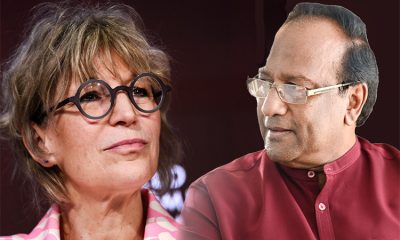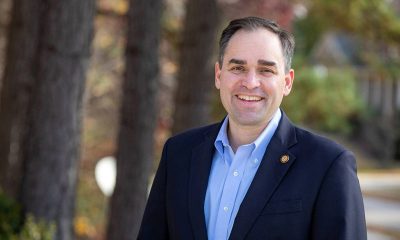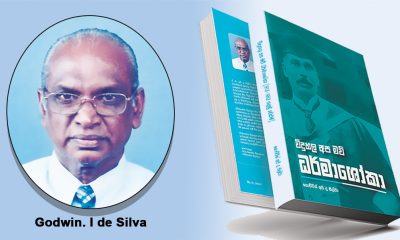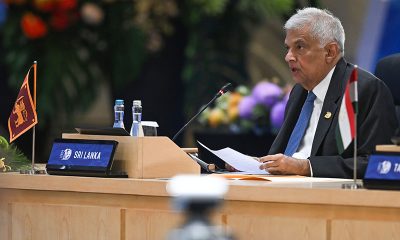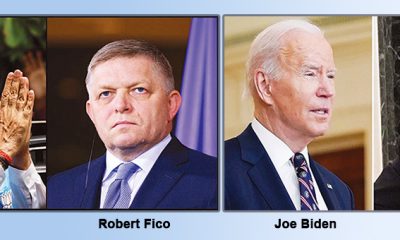Features
D E M O’Cracy obituary notice fifty years on …..

(This article was published late last year in the run up to the 50th anniversary of the original publication. The ‘author’ of the notice, the late Dr. Riley Fernando, had meticulously kept noted and documents connected to the original publication and these have been used to compile this article. It is repeated in view of the anniversary of the publicaton. – Editor)
By T. Ruth
The original D E M O’Cracy obituary was published in the State controlled Ceylon Daily News on April 24 1974. It is relevant today as it was then 50 years ago.
Curbs on freedom of assembly and of thought and expression
Press censorship and curbs on freedom of assembly were a feature of the early and mid 1970’s. On April 20, 1974 the then United Front Government imposed a curfew to ban a series of islandwide protest meetings organized by the opposition.
The Government sealed the offices of Independent Newspapers Ltd., which espoused the opposition view. Protests by the people and efforts by the Government to curb such protests and moves to stifle the free expression of thought and speech are common phenomena today as they were in the early and mid 1970’s. Moves are afoot to pass legislation to control the use of social media (Online Safety Bill) and other legislation such as the Broadcasting Regulatory Commission Bill and of course the Anti-Terrorism Legislation keeps cropping up from time to time. All this legislation is designed to curb the free expression of thought and speech.
Political and Economic Scenario There are both similarities and differences in the political and economic scenario that prevailed then and now. Foreign exchange shortages and import restrictions, rationing of food, price controls, ceiling on incomes and limits on property ownership were characteristic of the mid 1970’s. Today cost of living has spiraled to levels which are unprecedented. The high levels of taxation imposed upon on the citizenry makes life very hard for many.
Rationing of essential commodities and import restrictions in early to mid 1970’s were prevalent due to socialist policies advocated by the then Minister of Finance, Dr N M Perera. He was not prepared to accept the stringent conditions of the IMF. Instead he chose the route of austerity which meant ‘tightening of belts’ for the people. He believed that this was the way to avoid Sri Lanka becoming a bankrupt State. There were however no allegations of economic mismanagement leveled against him.
A recent Supreme Court judgment held that three Rajapaksa brothers and some of their advisors had breached the fundamental rights of the people by economic mismanagement resulting in Sri Lanka now being a bankrupt State unable to meet its debt obligations to creditors. Those found guilty of breaching fundamental rights of the people are still at large and worse still some are yet enjoying state patronage afforded to them in view of the positions held by them while the citizenry continue to suffer untold economic hardships.
- This is how the popular, mass circulating Reader’s Digest reported then Ceylon’s D.E.M. O’Cracy obituary notice hoax.
Corruption No effort is being made to pass legislation necessary for the recovery of stolen national assets. It is sad that the entire burden of the present economic crisis has to be borne by the populace and no action is being taken to take to task those responsible for corruption. In the early and mid 1970’s corruption was much less rampant than is the case at present.
The background and the ‘modus operandi’ Dr Riley Fernando the author of the D E M O’Cracy was a medical practitioner in Dehiwala. On April 21, 1974 the Government had imposed a curfew to ban mass protests which were to take place on that day. So he had no work in his medical clinic. It was towards evening that day that he got the brainwave to announce the death of democracy by way of an obituary notice.
The next day he went to Lake House and checked on the rates for obituary notices to be published in the Ceylon Daily News. He then sent the obituary notice by post with a money order to Lake House. On April 24, 1974 the most celebrated obituary notice in the history of our newspapers was published in the State run Ceylon Daily News causing roars of laughter from one end of the country to another!
It is believed that the number of copies of the Ceylon Daily News was an all-time record on that day! Everyone was clamoring for a copy of the Ceylon Daily News. It was said rightly or wrongly it had to be reprinted three times over.
Suspects There were many who were suspected of the authorship of this obituary notice. One was a well-known newspaper editor. His office was searched but it drew a blank. On the same day the obituary notice was published Dr Riley Fernando and his wife attended a social gathering at the residence of a fellow doctor. The general view among those present at the event was that there is no one in Sri Lanka who is capable of authoring such an obituary notice. It had to be the work of a foreign hand!
The day after the obituary notice appeared, a friend of Dr Riley Fernando also a fellow doctor whom he had known since his days at the Medical College visited his home with his wife. His greeting was ‘Congratulations! Your latest one is really superb!’ Dr Riley Fernando pretended to be dumbfounded.
‘Come on man’ the doctor went on ‘that obituary notice – of course I know that you did it’. He said ‘one has to have two qualities to do such a thing – firstly the wit and intelligence to think of it and secondly the courage to carry it through. You are the only person with both these qualities!’ he exclaimed.
Wreath of Red Roses A wreath of red roses was delivered to Lake House with a note of sympathy from ‘T. H. E. Masses’. The delivery boy was arrested and interrogated by the Police. He was clueless and was later released.
Interdiction of employees at Lake House Some employees of Lake House had been interdicted following the publication of this obituary notice. The training and upbringing that Dr Riley Fernando possessed was such that he could not bear to see innocent employees being reprimanded for something he had done. He was quick to write an anonymous letter to Hon Felix Dias Bandaranaike who was an important cabinet minister. He was the Minister of Public Administration, Home Affairs, Local Government and Justice at the time.
Dr Riley Fernando and Hon. Felix Dias Bandaranaike knew each other from the time they were in the kindergarten of Trinity College, Kandy. In his letter Dr Fernando requested that the Lake House employees who have been interdicted be reinstated. Otherwise he said he would have no option to own up and face the consequences. The employees were reinstated immediately and the Police were instructed to call off all investigations.
In Parliament – O’Cracy is O’kay! The subject of this obituary notice was discussed in Parliament on May 8, 1974 (Hansard pages 1686 – 1689) with an entire afternoon being taken up for discussion.
One member said that ‘This fellow must be caught and skinned alive on Galle Face Green!’ members of the opposition demanded a debate on the issue.
Dr W Dahanayake the ebullient Member for Galle insisted on having his say about the death of democracy and had to be forcibly removed from the Chamber by the Sergeant-at-Arms for defying the Speaker’s orders asking him to sit down. Parliamentary sittings suspended for five minutes in view of the resulting commotion.
Hon Felix Dias Bandaranaike treated the whole episode as a joke. He made a speech in Parliament. He said that he was away from Sri Lanka on the day on which the obituary notice had appeared but it was customary of him to read the past newspapers following his return to acquaint himself of what had taken place when he was away.
He said that he did so this time too following his return to Sri Lanka. Then he noted that a few of his friends had passed away during his sojourn overseas. One was an old Irishman named O’Cracy who had been living in Sri Lanka for many years. He said that he immediately sent his security officer to the address given in the newspapers to check on the facts and offer his condolences. The security officer had returned saying that the whole thing was a hoax.
He told me ‘There is absolutely nothing wrong with Mr O’Cracy. Not only that – all the members of his family are in good health – Mrs T Ruth and Mr L I Bertie and the rest of them’.
Hon Felix Dias Banadaranaike went on to say that in the past there were some occasions when Mr O’Cracy had some narrow escapes. One was when Dr W Dahanayake was Prime Minister when Mr O’Cracy had actually gone into hiding. Then in 1962, the Hon. Leader of the Opposition [Hon. J R Jayawardene] was stoutly defending persons who were in pursuit of Mr O’Cracy determined to destroy him.
Then in 1971, Mr O’Cracy was really in trouble. He nearly decided to go back to Ireland. He thought the insurgents there were safer than the ones here. Mr O’Cracy is extremely happy [now]. Apparently some of the wreaths which had been sent for his funeral had reached Lake House by mistake.
Dr Colvin R De Silva whose prose can be mellifluous or biting as the occasion demands it referred to the statement made by Hon Felix Dias Bandaranaike on the floor of the House that day as a ‘gem of a speech’.
The country mourns and the world sympathizes There was reference to the D E M O’Cracy obituary notice in the international press. ‘The Hindu’ reported it on April 25, 1974. The ‘Daily Telegraph’ UK made reference to it on April 26, 1974. There were references to it in the media in several other countries too. The Reader’s Digest published it in the November 1974 issue.
Dr Riley Fernando claims authorship of the obituary notice
Dr Riley Fernando left for the UK in 1976 two years following the publication of the D E M O’Cracy obituary notice in 1974. Following the General Election in 1977 there was a change in the Government. Following his return to Sri Lanka in December 1978 he decided to accept authorship for the prank that shook a Government. The receipt of a letter signed by L I Bertie took the Sunday Observer to the Galle Road Dehiwala residence of Dr Riley Fernando to meet the man who announced the death of D E M O’Cracy.
In conclusion
Dr Riley Fernando entered his eternal rest in June 2003 at the age of 75 following a brain hemorrhage.
The documents relating to the D E M O’Cracy obituary notice had been maintained so meticulously by him as if he knew that they will be necessary to author this article fifty years on.
Features
PRESIDENT’S COMMITMENT TO RECONCILIATION NEEDED

by Jehan Perera
On numerous occasions President Ranil Wickremesinghe has said he was elected president to get Sri Lanka out of its economic morass and will do his utmost to fulfill that obligation. This has led to much speculation regarding the president’s intentions with regard to conducting presidential elections prior to achieving economic success. The truth of the president’s utterances with regard to his commitment to resolving the economic crisis is to be plainly seen in his determination to push ahead with unpopular economic policies. He has been unrelenting in sticking to higher tax rates than the masses of people can ill-afford and to the privatisation of state owned enterprises which has been fought against tooth and nail by most of the employees. Both of these policies are unpopular to the point of jeopardising his bid to be re-elected at the forthcoming presidential election, but the president has stuck by his convictions.
There was also a second promise that the president made soon after surprisingly becoming president elected by parliament even though holding only one of the 225 seats in it. He said he felt he had an obligation to solve the ethnic conflict that has been with Sri Lanka from the dawn of Independence and not leave it to burden future generations. It would be no exaggeration to say that Sri Lanka lost thirty years of foreign investments and accompanying development due to the instability brought about by the war. The president reassured the people that as the political solution to the ethnic conflict had been discussed and negotiated many times in the past, he would build on those past efforts to achieve success. He promised this would all happen in the country’s 75th year of Independence, now more than a year ago.
Over the past two years since becoming president, President Wickremesinghe has sketched out his vision of reconciliation in Sri Lanka in very clear and precise terms. He has done so at numerous international and national forums. He did so, for instance, at an inter-religious symposium on peace and reconciliation in March this year in Colombo by the National Peace Council, which was attended by religious clergy and civil society activists from all parts of the country. In a matter of no more than twenty minutes, the president sketched out the essential elements on such a solution without consulting any notes, as it was all in his mind. But unfortunately for Sri Lanka and its people, the president has not chased down those reforms in reconciliation in the manner he has for the economy. The level of commitment appears to be different.
President’s Failure
The president’s failure to stand by his own vision of reconciliation and a political solution to the ethnic conflict is costing the country dearly. The absence of a strongly held and consistent policy on national reconciliation became obvious in the most unfortunate way in the past two weeks. It began with the heavy handed efforts of the police to prevent Tamil people from publicly commemorating their loved ones and those who had perished in the last phase of the war. The police went to the extent of securing court orders which they misapplied to prohibit people from gathering together to remember the suffering of those last days and to share the kanji (rice porridge) that sustained the lives of those trapped in the battlefield with nowhere to go.
There were a few locations where the heavy hand of the police was used directly to suppress the people coming together, though this may have deterred much larger numbers of people in many more locations from trying to do the same. But these incidents, though few, were captured on video and circulated around the country, and the wider world, which certainly showed the government in a very bad light. One such incident captured on video shows police going to the homes of women who commemorated the loss of their loved ones in defiance of the police orders not to do so in public. The police chose the night time to make their foray into the homes of the women, perhaps to make it easier for them to arrest the women. But the women resisted arrest and therefore had to be dragged screaming and struggling into the police vehicles.
Another similar incident in which the police appear in an unfavourable light was when they went to Eastern University where a small group of students were engaging in a memorial activity centering around the sharing of rice porridge among themselves on the lines of “do this in memory of me.” As the court order not to engage in such activities had changed by now, and the president himself had said that such memorials are permissible, the police did not forcefully seek to stop the students from going ahead with their memorialization ceremony. However, they showed their opposition by pointing at the students in a threatening manner and speaking angrily at them. They also took video films of the students and their ceremony at close range, which would create the fear in the students that this material was being kept by the police for future use.
Not Reconciliation
What took place in the country over the past two weeks in the north and east in the run up to Mullivaikkal Day was not reconciliatory but indicated resentment and confrontation. This is contrary to avowed government policy, which draws its inspiration from the resolution that the government under Prime Minister Ranil Wickremesinghe signed in 2015 in agreement with all the 47 countries in the UN Human Rights Commission. In terms of this resolution, the government has done much, setting up an Office on Missing Persons, an Office of Reparations and an Office for National Unity and Reconciliation in the period 2016 to 2018. In addition, after taking on the presidency in 2022, the government under President Wickremesinghe has been doggedly going ahead with setting up a Truth and Reconciliation Commission. However, given what is happening on the ground, the credibility of the government is low in terms of the people’s belief in its willingness to deliver on the national reconciliation process.
When a country wants to progress from having been in a situation of war and division to peace and reconciliation, there is an internationally accepted four-step process. This is to ascertain the truth of what happened during the period of conflict, hold to account those who violated the law, offer compensation to those who were victimized by the conflict, and engage in political reform to ensure that the root causes of the conflict are addressed. Before his term of office comes to a close in six months, President Wickremesinghe still has the opportunity to redeem the government in the eyes of both its people and the international community. He needs to do this soon as the international political climate is becoming more negative to Sri Lanka where the reconciliation process is concerned, which could have a spillover effect onto the economic recovery process as well.
The annual statements of Canadian prime minister Justin Trudeau that genocide occurred during the final stages of the war, the new resolution calling for a referendum on Tamil Eelam presented to the US Congress by a bipartisan group of US legislators, and the latest report of the UN High Commissioner for Human Rights that the government should acknowledge the involvement of state security forces and affiliated paramilitary groups in human rights violations and to issue a public apology cannot be simply ignored. These similar positions taken by powerful global actors show that the problem of reconciliation is not going to get better on its own, but needs to be actively promoted. Though the time remaining is short the president needs to urgently convene an all party conference to work out a roadmap to reconciliation that they agree to support now and after the forthcoming election. While an all-party conference is not the magic solution, it can be a constructive step towards reconciliation and stability, provided it is inclusive and backed by a genuine commitment from all political parties involved.
Features
International recording stars, global icons…in our scene!
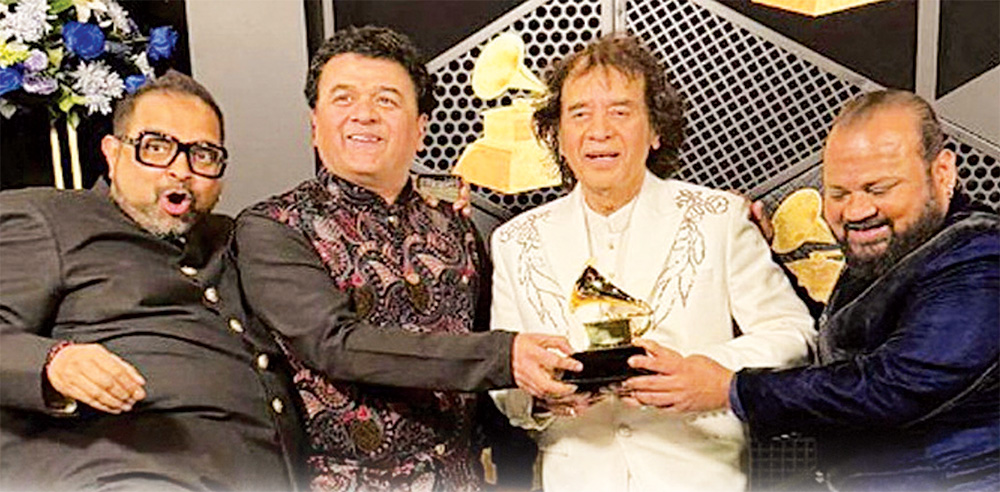
 Quite a few of our local artistes describe themselves as international recording stars…and global icons!
Quite a few of our local artistes describe themselves as international recording stars…and global icons!
Of course, we would love to have such performers in our midst, but, unfortunately, none of these artistes come into either of the categories – International Recording Stars, or Global Icons.
According to informed sources, International Recording Artistes are individuals who have gained recognition, and acclaim, for their singing talents, and contributions to the music scene, on a global scale, with world-wide chart hits, etc.
The difference is that artistes who are recognised by their country are National artistes, while International artistes are recognised globally…the whole world.
As for Global Icons, the rise of K-Pop has been phenomenal, with groups like BTS, BLACKPINK, and EXO dominating the charts and breaking records, worldwide.

Tanvi Shah: First Indian woman to win a Grammy Award
Their catchy tunes, intricate choreography, and strong social media presence have propelled them to global superstardom, setting new trends in the music industry.
I would also classify Olivia Rodrigo and Taylor Swift as present day Global Icons. Of course, there are many more.
Olivia Rodrigo has already cemented herself as one of the hottest new music icons of the twenties because of her chart-topping album ‘Sour’ with smash hits ‘Good for You’ and ‘Driver’s License’, emerging as global chartbusters.
Taylor Swift has been a music icon since the early 2000s and dropped some of the biggest albums of the millennium, but the twenties may still be her most significant decade yet as she has re-recorded and released Taylor’s Version of many of her hit songs and records and they have turned out to be chart-topping hits – world-wide.
Where local artistes are concerned, some of them are being hyped up way beyond their capabilities and these performers just keep blowing their own trumpet, at every given opportunity, with hardly anything new to offer the international scene.
In today’s ever-evolving music industry, the influence of foreign music cannot be overlooked but have any of our artistes been able to do the needful with their music – capture the international music scene, on a global scale…and I mean a global scale.
Except for bassist Hussain Jiffry, playing bass for Herb Alpert and wife Lani Hall’s quintet, who took home a Grammy, when the group won the Best Pop Instrumental Album Award in 2014, we have absolutely nothing to our credit,
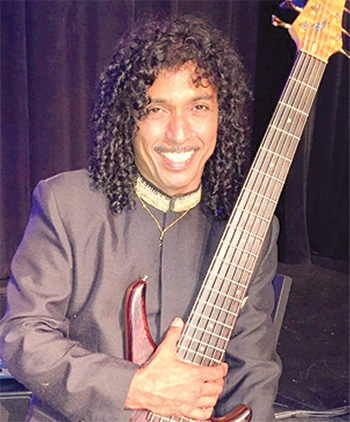
Hussain Jiffry: Grammy Award in 2014
The Indians have won several Grammys, with fusion band Shakti winning Best Global Music Album at the 2024 Grammy Awards in Los Angeles
Tanvi Shah, Indian’s first woman to win a Grammy Award (for her performance in the song ‘Jai Ho’ from the movie ‘Slumdog Millionaire’), was seen in action at the Dubai International Stadium, early this year, and cricket enthusiasts and music aficionados witnessed a unique collaboration between two subcontinent legends and a talented musician.
Cricketers Danny Morrison and Wasim Akram, along with Tanvi Shah, created a dynamic trio that blended the sport of cricket with the brilliance of music.
What a day it will be if ever we win a Grammy or have one of our artistes top the charts in the scene that matters – UK Top 10, Billboard Top 10, or World Singles Chart.
Features
High Commission in Nairobi hosts International Vesak Day at UN Office
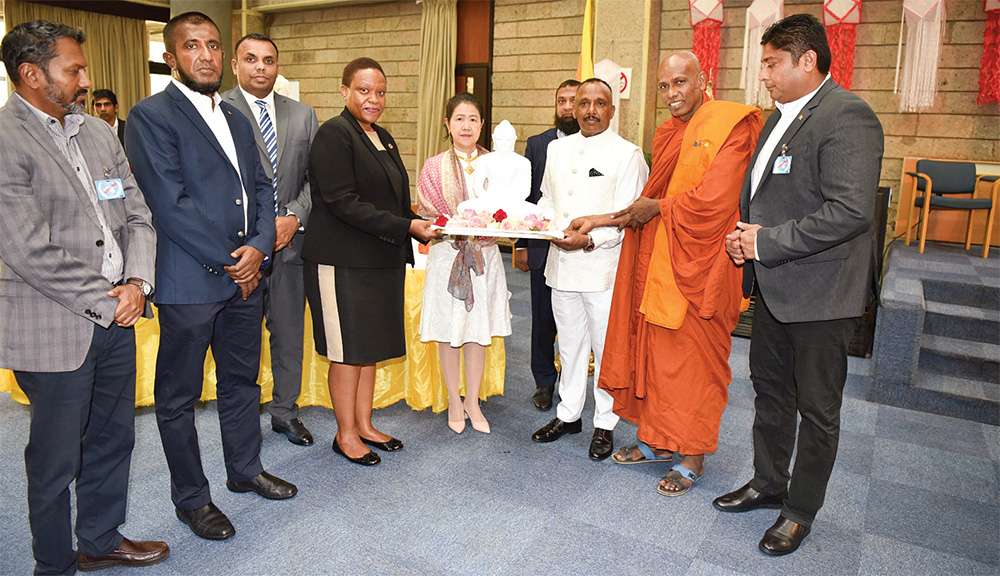
Nairobi, Kenya – In a momentous celebration that brought together various dignitaries and distinguished guests, the High Commission of Sri Lanka and the Royal Thai Embassy in Kenya jointly hosted the International Vesak Day 2024 at the United Nations Office in Nairobi. This significant event commemorated the Birth, Enlightenment, and Passing Away of Lord Buddha, coinciding with the 25th anniversary of the UN General Assembly resolution 54/115, which officially recognized Vesak Day internationally.
The ceremony was graced by the esteemed presence of Venerable Dr. Ilukpitiye Pannasekara Thero, Chief Monk for the African Continent from the Buddhist Temple and Meditation Centre in Tanzania. Distinguished guests included the Director of the United Nations in Nairobi, Ms. Sandra Macharia, His Excellency Maurice Okoth Amisi, Director of Asia Pacific at the Ministry of Foreign Affairs, and numerous dignitaries, excellencies, and other distinguished attendees.
The UN Under-Secretary-General and Director of the United Nations Office in Nairobi, Ms. Sandra Macharia, delivered a special Vesak Day message from UN Secretary-General António Guterres. Guterres emphasized the profound resonance of Vesak’s principles with the goals of the United Nations. He highlighted that Buddha’s teachings of tolerance, compassion, and service to humanity provide solace and strength in today’s troubled times.
In a gesture of goodwill and solidarity, High Commissioner Kananathan accompanied by the representatives of Buddhist, Christian, Muslim and Hindu communities bestowed a sacred Buddha statue to the UN Offices in Kenya, symbolizing peace, enlightenment, and the profound spiritual connection between communities.
High Commissioner Kananathan expressed gratitude to the co-sponsors of the 1999 resolution. He highlighted the profound relevance of Vesak Day in today’s world, stressing the need for peace and compassion amidst modern challenges.
“This is a time for deep contemplation on Buddha’s timeless teachings,” Kananathan said. “Celebrating 25 years of UN recognition, Vesak Day serves as a reminder of the principles of love, compassion, and non-violence. It calls for reflection on our actions and inspires efforts toward social justice, environmental protection, and the alleviation of suffering.” He urged attendees to dedicate themselves to creating a world guided by wisdom, empathy, and respect for all beings, embracing Buddha’s qualities of love, compassion, joy, and calmness.
Kananathan also expressed sincere gratitude to participants of all religious beliefs, noting that Buddhism promotes world peace and universal harmony beyond faith, language, and cultural differences. The diverse attendance underscored a shared commitment to understanding, compassion, and cooperation for the betterment of the global community. He emphasized that true world peace can only be achieved through the creation of peaceful individuals, highlighting the UN’s role in building frameworks for global betterment.
The High Commission of Sri Lanka in Kenya actively engages in community events and celebrations that highlight shared values and foster global peace and cooperation. The celebration of Vesak Day at the UN underscored shared human values and the enduring impact of Buddha’s teachings on global peace and unity.
-

 News7 days ago
News7 days agoAmnesty International head to join M’vaikkal commemoration
-

 News6 days ago
News6 days agoFashion design teacher arrested for rape
-

 News3 days ago
News3 days agoIndia-gifted ambulance service in Sri Lanka in need of critical support
-

 News4 days ago
News4 days agoBipartisan US Congress legislation calls for self-determination for Eelam Tamils
-

 Features3 days ago
Features3 days agoA valuable publication of the history of Dharmasoka College, Ambalangoda
-

 Latest News1 day ago
Latest News1 day agoPresident highlights Global North’s failure in Climate Change Financing at 10th World Water Forum
-

 Features3 days ago
Features3 days agoRituals in a village community at Paiyagala 75 years ago
-

 Features3 days ago
Features3 days agoWestern Discontents, India’s Long Election and Sri Lankan Anniversaries















